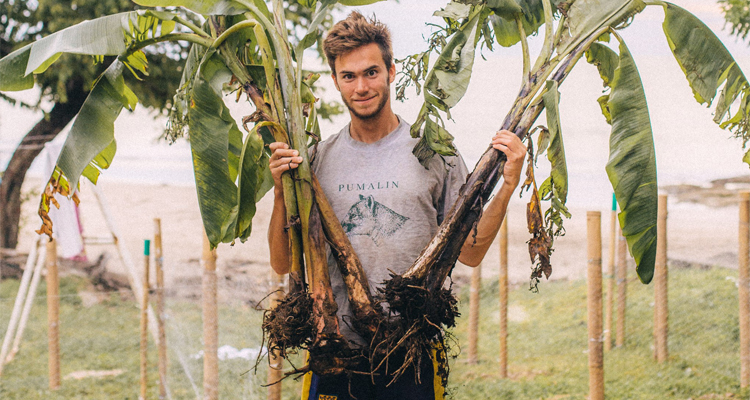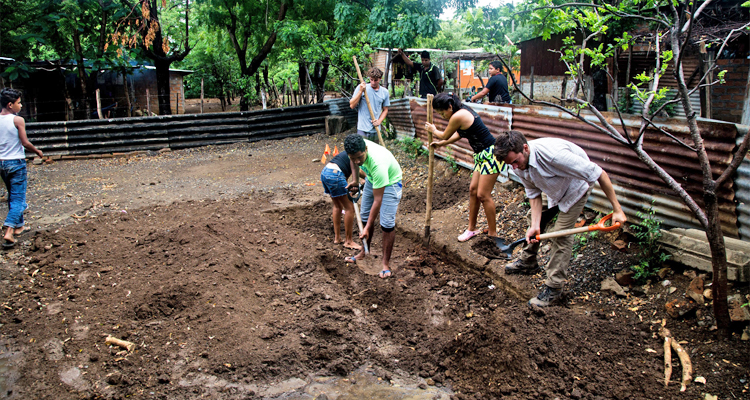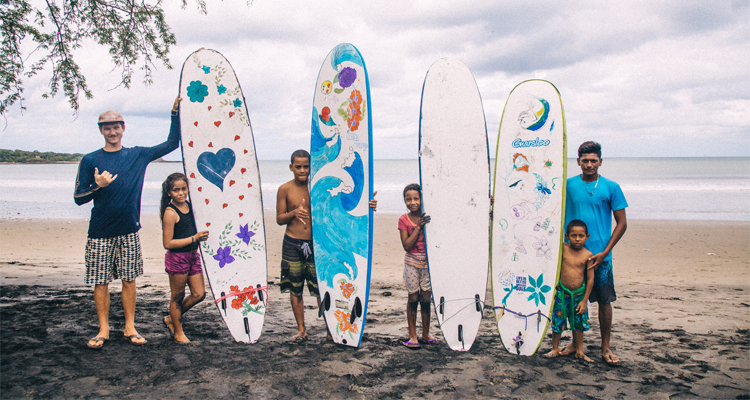Remembering my time at Stowe, the photos which amazed me the most were the black and white stills of Stoics working in the School grounds in the 1920s and ’30s. I thought of these students as stewards, looking after a sacred place dedicated to their enlightenment as young curious minds, and I was inspired. In the sixth form, I took time off rugby to clear the old apple orchard, which was completely overgrown, spending rainy afternoons in the garden with Mr Chan and a handful of other students, getting just as muddy as the rugby players, who would walk past us on their way back from the Bourbon.
Five years later, I found myself working as an agroecologist in the rural towns and villages of Central America. In El Astillero, Nicaragua, manure paves the muddy roads and dirty grey water pours out onto the garbage-ridden streets, on to the beaches and into the ocean. Infections are easy to come by and the residents are unhealthy due to a lack of access to organic food. Fisheries, the main source of income for the community, are collapsing, leaving desperate fisherman with no option but to slaughter hundreds of turtles and cut out their eggs.
All of this was quite a different learning experience for me. Armed only with the money I saved working on a farm in Haida Gwaii, my degree in Environment and Sustainability from the University of British Columbia and, most importantly, an incredible group of dedicated and passionate friends, we headed to Nicaragua to live in an abandoned Soviet canning factory and to grow resilient social and environmental systems.
In El Astillero, I built soil with the manure that covered the streets; captured rainwater to extend the growing season into the summer drought; saved and distributed local varieties of seed and constructed systems that treat grey water on site to prevent dengue and chikungunya. We engaged local children during the construction process and sought their enthusiastic help with planting banana trees. We also collected, sorted and up-cycled plastic waste. All whilst beginning a dialogue about local food sovereignty, working with the local doctor and school to promote healthy eating and building capacity for the local community members to do the same via workshops, and being there to support whoever wanted to start a garden or treat their greywater, but simply did not have the resources to do so. Bordering Astillero is the protected and highly significant Chacocente Wildlife Refuge, one of the largest fragments of tropical dry forest left on our planet. This area is under several pressure from the communities that live in and around it including the poaching and killing of sea turtles, illegal harvesting of wood and iguana eggs and uncontrolled cattle grazing.
Our ecology programme provides education in ecosystem preservation, restoration and agroecology practices. We are showing locals the long term benefits that nature holds and teaching them to respect the earth, cultivate sustainable resources and create entrepreneurial value from protecting the environment. We work with school children, teaching them about ecology and going on field trips with all the students into the nature reserve where the turtles nest. It was the first time these children were ever allowed to see an arrival of thousands of nesting turtles, an unforgettable site. Children are the future leaders of this community, and we have been working closely with local schools to ensure that the future stewards of the land understand the importance of biodiversity and resilience. We also brought surfboards and taught community members surf lessons free of charge, allowing them to access some of the world’s best waves that crash along their shores. We hope that by empowering the next generation and giving them the opportunity to improve their livelihoods in a sustainable way, we can create a better future for all members of the ecosystem.
It was an incredible experience and my time at Stowe prepared me for this work in many ways.
We want to ensure our effort continues to grow a sustainable future for the people of El Astillero and our work is not over. Our organisation is called Casa Congo, please visit our website: www.casacongo.org. We are currently fundraising to finish the construction of a bamboo research centre and conservation school, our agroecology programme and ocean advocacy work (casacongo.causevox.com). We would be grateful for any support. Every contribution, no matter how small, will help us make a difference.
Click here to watch a video of Lucas’ latest progress: https://vimeo.com/281892231
Lucas Worsdell (Grafton 13)




